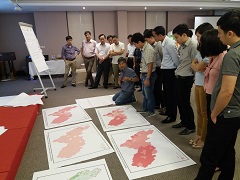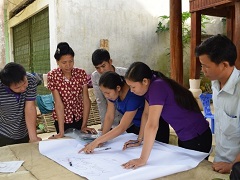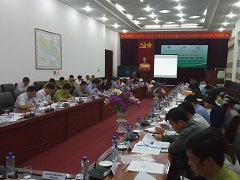- Home
- Technical Cooperation Projects
- Index of Countries
- Asia
- Viet Nam
- Project for Sustainable Natural Resource Management (SNRM)
- Project News
- Key step towards sustainable forest management: Provincial REDD+ Action Plans formulated for the four Northwest Provinces
Project News
2017-12-27
Key step towards sustainable forest management: Provincial REDD+ Action Plans formulated for the four Northwest Provinces
As a response to climate change mitigation calls and in order to promote sustainable forest management, Vietnam has recently issued its National REDD+[1] Action Program (NRAP) under which each forested province is requested to formulate a Provincial REDD+ Action Plan (PRAP) for the implementation of REDD+. In this context, the SNRM Project has provided its support to the development of PRAPs in the four Northwest Provinces of Hoa Binh, Son La, Dien Bien[2] and Lai Chau.
Although the four provinces are commonly grouped as "Northwest Provinces", their forest-related issues and development contexts are quite different. In Hoa Binh Province, timber production has been on the rise to supply wood chip and lumber to processing plants or markets in Hoa Binh and nearby provinces. Meanwhile, in Son La, agricultural production boosted in recent years results in less incentives among local people for forest management activities. In Dien Bien, the expansion of slash-and-burn agriculture has halted forest restoration rate, keeping it low under provincial targets. Lai Chau Province has the richest forests among the four provinces. However, deforestation due to recent development of roads and hydropower dams in the province has been a concern. Given this background, PRAP formulation was expected to promote sustainable forest management through its multi-sectoral approach.
In formulating PRAPs, each province firstly set up a team. After the joint kick-off workshop held in Hanoi in October 2016, a common working process was agreed on for immediate start of the formulation work. The process included the following key steps: review of the provincial development plans and forest protection and management policies; analysis of factors leading to deforestation or forest recovery through combined use of satellite-based information and field surveys/ consultations; identification of intervention packages; budget planning and implementation arrangements. Working towards positive influence on people's life and forest environment from PRAP formulation; however, the provinces need to predict negative impacts of future PRAP implementation and build in a mechanism to avoid or mitigate them. The entire process was meaningful for the provinces to reflect on their forest protection and management policies.
In order for the PRAP to be a feasible plan, interests, opinions and benefits of all stakeholders need to be incorporated. A number of consultations were organized targeting different stakeholders at provincial, district, commune and village levels. After a series of discussions and revisions, the draft PRAPs were completed in May 2017. Thereafter, the drafts were reviewed by the central government and the provincial government before being officially approved in September.
Following the approval of the PRAPs, a workshop was held in Son La Province in November, with the participation of project provinces, Management Board for Forestry Projects under Ministry of Agriculture and Rural Development (MARD) and Project Office, for each province to share their experience of PRAP formulation and PRAP contents. Afterwards, each province held a provincial workshop to discuss how to effectively implement the PRAP in their province. As Vietnam is progressing in REDD+, it is hoped that the four Northwest Provinces will take this opportunity to further promote sustainable forest management for their future.
 Discussing the forest change in Lai Chau Province using the forest change maps created from satellite-based analysis.
Discussing the forest change in Lai Chau Province using the forest change maps created from satellite-based analysis.
(Joint Kick-off Workshop, Hanoi)
 Discussion with a local community - key players for implementing the PRAP.
Discussion with a local community - key players for implementing the PRAP.
(Muong Gion Commune, Son La Province)
 After a number of consultations, the PRAPs were finally approved.
After a number of consultations, the PRAPs were finally approved.
(PRAP Final Consultation Workshop, Lai Chau Province)
Notes
- [1] Reducing emissions from deforestation and forest degradation and the role of conservation, sustainable management of forests and enhancement of forest carbon stocks in developing countries.
- [2] Dien Bien Province, with the support of "Dien Bien Province REDD+ Pilot Project" (March 2012 – September 2013) funded by JICA, already formulated its PRAP in May 2014. The support of SNRM was to revise and update the PRAP following the PRAP formulation guideline issued by MARD.
- About JICA
- News & Features
- Countries & Regions
- Our Work
- Thematic Issues
- Types of Assistance
- Partnerships with Other Development Partners
- Climate Change / Environmental and Social Considerations
- Evaluations
- Compliance and Anti-corruption
- Science and Technology Cooperation on Global Issues
- Research
- JICA Development Studies Program / JICA Chair
- Support for the Acceptance of Foreign HRs / Multicultural and Inclusive Community
- Publications
- Investor Relations
